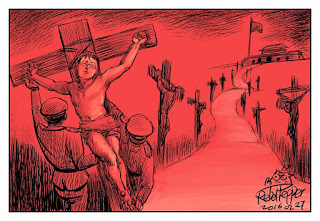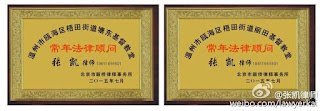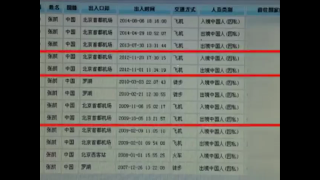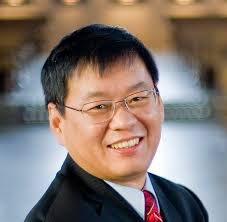 |
| Yang Fenggang |
China Aid
Written in English by Brynne Lawrence.
(West Lafayette, Indiana—March 24, 2016) A professor at Purdue University recently published an article regarding the case of a prominent Christian human rights lawyer.
The article, written by Dr. Fenggang Yang, analyzes the case of Zhang Kai, a human rights lawyer who was incarcerated for nearly seven months for his opposition of an ongoing cross demolition campaign.
Zhang was released from criminal detention yesterday after being held in police custody for nearly seven months. After authorities apprehended him on Aug. 25, 2015, Zhang was placed under residential surveillance, otherwise known as a “black jail,” for six months. On Feb. 25, he appeared on state television and confessed his crimes, an action many believe was coerced. Subsequently, authorities charged Zhang with “endangering state secrets” and “gathering a crowd to disturb public order” and criminally detained him.
A full translation of Dr. Yang’s article can be read below.
China Aid exposes cases such as Zhang Kai’s in order to promote religious freedom and rule of law in China.
On February 25, 2016, the official website of the municipal government of Wenzhou city, China, published a statement entitled “The Truth of Wenzhou Zhang Kai’s Case”. Almost at the same time, Wenzhou television broadcast a program entitled “What Lies behind the Case of Zhang Kai”. In nearly 11 minutes, this program was featured with Zhang Kai’s self-confession, allegations towards him from a random crowd, and some speculative evidence, as well as the anchorman/commentator’s subjective judgment of the nature of Zhang’s “crime”. Later, Zhejiang TV relayed the same program with the same title with the same length, also did Zhejiang News Network, though with a shortened length of 3 minutes and 29 seconds.
In a matter of no time, public outcry erupted everywhere. International media outlets, including those in Taiwan and Hong Kong, began reporting on the event, and many netizens in Mainland China also reacted strongly on Weibo (microblog) and Wechat, criticizing this practice authorized by the government. The public concern can be summarized into three points: first of all, since Zhang Kai was detained on August 25, 2015, no one—not even his family and lawyers—have been allowed to see him, hence it is only natural to ask: was Zhang Kai’s public confession to false charges obtained by means of torture? Second, a man was forced to confess on television in public without a court hearing, this is not only against the principles of modern justice, but also violates China’s own legal procedures. Third, the television host/commentator had neither the power nor the qualifications to place sentencing in the absence of the judge.
More importantly, the so-called evidence mentioned in the official statement and video recordings is, in fact, highly dubious. Inspired by such evidence, some people began to speculate about the whole story, which, despite their kind intentions, could easily lead to misunderstanding and misinformation. Therefore, it is necessary to seek the truth behind such “evidence” from the facts.
1. So-called “gaining public trust in order to collect money, instigating the faithful to illegal gatherings”
This was the first subheading of the “Truth” statement. Under this subheading, the authorities listed some events that seemed to be associated with Zhang Kai, which formed the cause of his arrest.
The key charge towards Zhang Kai is that he once successfully represented a church pastor named Huang Yizi 黃益梓for a criminal case, which “tricked” (or rather, gained) the trust of a significant number of Wenzhou Christians. After this case, some churches began to hire Zhang Kai and other lawyers as their legal counsels, and Zhang Kai therefore “collected” (or rather, accepted) the consultation fee. Consultations and advice provided by Zhang Kai as a lawyer, was said to be “instigating illegal gatherings” in that statement.
The case of Huang was widely reported by international media, and there is plenty of information available online. Pastor Huang’s arrest is the result of a series of events. On July 21, 2014, when facing forceful removal of the church cross, the faithful protected the church with their bodies and many were physically injured from the police force who were wearing helmets and uniforms. Out of dissatisfaction with the governmental violence, a few family and congregational members went to the municipal government to negotiate, and Pastor Huang, upon hearing the incident, rushed to help to calm the situation. However, on August 3, 2014, Huang himself was detained for “suspicion of gathering to assault state organs” before he was formally arrested.
During that time, Zhang Kai was a visiting scholar at our Center from summer 2013 to 2014. In other words, Zhang Kai only returned to China after Pastor Huang’s arrest. At the time, there had already been a group of human rights lawyers who had begun defending the rights of Wenzhou Christian churches, and Zhang Kai was not yet one of them then, as he needed to deal with jetlag and to readjust life and work.
After Huang’s arrestment, the defence of rights from family and lawyers were met with obstacles from the police. Upon knowing Zhang Kai’s past rights defense endeavors, Huang’s family approached him and invited him to be part of the defense team, to which Zhang agreed. I heard that some human rights lawyers who were already helping with church cases in Wenzhou showed discontent, as they felt that Zhang took over their business.
However, being human rights lawyers in China is a difficult job in itself, which comes with high risks and low returns. For those Christian lawyers who represent Christians, the difficulty is doubled, as Chinese Christians have been too used to the abuse and the pressure that they normally face, and are often unwilling to initiate a court case, or to pay for the law suit. Some expect Christian lawyers to represent them for free, and some even considered it a duty for Christian lawyers to do so. Zhang Kai was well aware of that, and he addressed this issue in his speech delivered at the Trinity Divinity School in the US “On the Predicament and Actions of Church Rights Defense”. However, he devoted himself to the defense of Wenzhou churches without hesitation, hoping to popularize legal knowledge for the general public and to increase civic consciousness.
As he had then become Huang’s representative lawyer, in October 2014, Zhang Kai requested to meet with Huang according to legal procedures, who was jailed at the time. Having faced consistent obstacles, Zhang Kai chose to sit silently in front of the detention center with a small board with words of the request as Huang’s attorney, pressing the detention center into allowing him to meet his client. After their meeting on October 13, Zhang uploaded a photo of Huang in his prison vest, which was widely discussed by the media and the netizens.
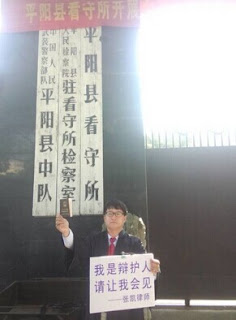
family was promised that as soon as they dismissed Zhang Kai as their lawyer, Huang would be released within a month. When I heard that that was why Zhang was dismissed, my heart was filled with for Zhang, while Zhang himself stated that “as long as the client could be released, dismissal is no big deal. Everything a lawyer does, should place the rights and interest of his client as the foremost goal, rather than the lawyer’s personal reputation or benefit.” Only that the Wenzhou police did not fulfill their verbal commitment, and Huang was still kept in prison after a month. Thereafter, the Huang family re-hired Zhang to be their representative, and Zhang devoted himself to this case without hesitation.
March 24, 2015, the hearing was held in the court of Pingyang County, Wenzhou. The trial started at two o’clock in the afternoon, and finished at seven; the verdict was issued one hour afterwards, which sentenced Huang one year in prison for “gathering crowds to disturb social order”. Later, Zhang Kai published an article entitled “The magistrates were allowed to burn down houses, while the common people were forbidden from lighting lamps – pleadings for Pastor Huang Yizi” 只許州官放火,不許百姓點燈:黃益梓牧師辯護詞. For those who had a relatively fair understanding of similar legal cases, they should know that Huang could have been sentenced to serve a much longer term in prison if not for a strong defense from Zhang Kai and other lawyers. Just ten months prior to this, Pastor Zhang Shaojie of Henan province was sentenced for 12 years in prison for “assembling a crowd to disturb social order” and “fraud”.
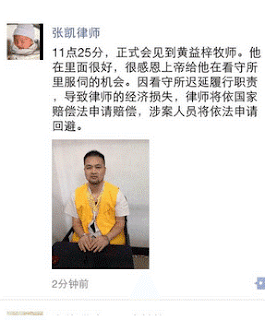 Through his skillful application of law for rights defense, Zhang has successfully won the trust of
Through his skillful application of law for rights defense, Zhang has successfully won the trust ofWenzhou Christians. He had also shown them, for the first time, that rights defense with legal procedures would have fruitful results. Therefore, more and more Christians turned to Zhang and some other lawyers for help when facing series of church demolitions and cross removals—which is still ongoing. To make communication more convenient, Zhang stayed in Wenzhou for a long time with two assistants. Up until mid-August 2015, there had been almost one hundred churches that had hired Zhang to be their long term legal counsel, some had even held listing ceremonies. It is a noticeable phenomenon that in recent years, more and more enterprises and organizations in China began to hire legal counsels. But for Christian churches to do so, this was the first group of churches doing so.
According to the information provided by the “Truth” article and the television program “Behind”, Zhang Kai “charged the churches with legal fees ranging from 5,000 to 30,000 yuan”, and he has received more than 200 million yuan, a “large sum of money,” for which he was charged with the crime of “accumulating wealth”. It is clear that the accuser knows very little about the practice of the profession nor the profession’s norms. It is required of social organizations to pay legal fee annually to their legal counsels. In Shenzhen, for instance, social organizations have to pay a legal counsel a minimum of thirty thousand yuan per year. The consultancy fee that Zhang Kai charged in Wenzhou appeared to be lower than the profession’s normal price. In addition, organizing rights defense activities requires extra expenses on traveling and accommodation, not to mention the extraordinary risks that human rights lawyers face in order to conduct rights defense activities. For instance, Zhang Kai had repeatedly been subject to death threats. And as a well-known criminal defense lawyer, his legal fees would have been quite high long before he participated in the rights defense for Wenzhou churches.
He had advised Wenzhou Christians not to carry out unauthorized demonstrations, but to abide legal proceedings, that is, not to protest unless the application for demonstrations is approved. In the case of disapproval, they should file a lawsuit to have the issue solved in court. This shows how Zhang Kai trusted the law. To take another example, it is true that the construction procedure for some Christian churches was not complete (although the reason for this is rather complex, including the inaction of certain government departments), these churches or the illegal parts within them could be removed according to laws or administrative regulations. However, the government’s enforcement needs to have clear and specific legal provisions, and the government should hear the churches’ pleading before taking actions, and the actions must be taken in accordance with legal procedures and the procedures of administrative considerations. If the practice of government departments appears to be unreasonable, or did not accept the church’s petition, the matter should be dealt with in court, and the law enforcement agents should only take removal actions after the trial. The ongoing campaign to remove the crosses on the top of the churches, it clearly lacks legal basis. Even though Zhejiang province later published a regulation of religious buildings and cross sizes, whether that administrative regulation is reasonable and legitimate should have been discussed by the public, by the experts of related aspects, and by the People’s Congress. In short, Zhang Kai had always stressed that Christians should not only strictly follow the law in their own work, but should also help and urge the government to abide by the law as well, so that the major policies of the rule of law can be implemented and enforced.
The “Truth” article accused Zhang Kai of assembling the leaders of main local Christian churches for training, encouraging believers to wear uniforms with “anti-demolition” logo, holding a small cross in public space, asking key church members to post photos and videos online, and organizing foreign journalists to conduct interviews in Wenzhou with the attempt to bring further international influence.
To tackle these accusations, I should point out that first of all, since there was a great number of people asking for consultation, rights defense lawyers are much less in number, Zhang Kai could only gather people in the church to listen to his legal advice to Christians on the rights they possess as citizens, which legal provisions and regulations may be used to defend the rights they are entitled to, and how to deal with various legal issues that they may encounter. Why would it be wrong for a lawyer to popularize legal knowledge?
Second, in the process of resisting cross demolitions, some people spontaneously put on T-shirts printed with crosses, and some made mini red crosses. Which law have they violated for wearing T-shirts with crosses or holding mini crosses praying in front of churches when their crosses were being demolished? For such a spontaneous reaction, Zhang Kai might have coordinated to a certain degree, which, in my opinion, serves to maintain the social order and the legitimate expression of discontent. Isn’t it hundred times better than leaving it to the collective burst of anger?
Moreover, why would the action of some witnesses of the event sharing their photos and video recordings online violate any law? From the photos and videos that I saw on Weibo, those Christians were as peaceful as a flock of sheep, which earned my greatest respect. Even sheep flocks would cry out when facing aggression, so don’t those people have the right to cry out loud?
Finally, with regard to foreign correspondents’ interviews, it seems that Wenzhou authorities have very little understanding of the operation of foreign media. Different from the party-owned state media in China, the media in western countries, as well as those in Hong Kong and Taiwan, operate independently, free from official orders and do not necessarily follow instructions from any organization. What they choose to report or not to report, or how to report, is completely determined by each reporter him or herself and the editor in charge. Since the demolition of Sanjiang church, there have been quite a lot of concerns from international media who reported the situation of Wenzhou and Zhejiang, and their articles were often written in and sent from Wenzhou. As far as I know, many Wenzhou Christians were avoiding reporters, as most of them do not know that freedom of expression is a right guaranteed by the Chinese Constitution, not to mention the importance of “speaking the truth with love” in any situation. What Zhang Kai did was merely to popularize the law and to encourage people to be honest and truth-telling. Which law did he violate for doing that?
In short, in my opinion, Zhang Kai’s action of promoting rights defense in terms of laws, can be regarded as upright and blameless! Even if there was any suspicion of illegal practices, that needs to go through a court hearing, in order to achieve a fair verdict. To be sentenced without a trial is against China’s rule of law, which is the foundation of the state.
2. So-called “scheming with organizations and persons from overseas, growing ambitions with the rise of fame and fortune”
This is the second subheading of the “Truth” article, stating that the aim of Zhang Kai’s participation of promoting rights defense in Wenzhou is just for the sake of financial gain. Except those who were behind the “Truth” article and the “Behind” program, I’m afraid that very few people would really believe this. In addition to accumulating money, a more frightful accusation to many people is of Zhang Kai’s association with foreign organizations and personnel.
The official article and program stated that “over the years, through a proxy of cases related to religion, he (Zhang Kai) got a hundred thousand yuan in seven times from external organizations”. This “crime” really made me laugh. Previously I have already mentioned that Zhang Kai had collected two million yuan, “a large sum of money”, by acting as legal counsel for a hundred churches. Compared to this income, the amount of a hundred thousand yuan from overseas financial support, is it not out of proportion? Clearly, therefore, the overseas support for rights cases is just symbolic and moral, instead of financial. I do believe that the rights defense movement of house churches should rely on their own awareness and resources. It is unreasonable to have money to build the church but not the money to hire a lawyer!
If we carefully watch the TV program “Behind”, we can find that it has shown three kinds of evidence of three different bank transaction records. The first two are the left parts of deposit receipts, showing the account holder: Zhang Kai. The deposited currency is in dollars. The numbers are 4,070 and 2,928 respectively. The third is the right part of a deposit, showing the number withdrawn is 25605.59, which is very clearly the $4,070 on the left part converted into the amount in RMB (yuan). There is Zhang Kai’s handwritten signature on this right part, and the date of the transaction is March 5, 2012. This so-called “evidence” shows neither the person making the remittances nor the reason or purpose for making this transaction. In today’s China, how many people have business dealings with foreign banks? A lot. In the age of globalization, this kind of business dealing is part of the ordinary life of many ordinary people. More importantly, the date shown is March 2012, two and half years before Zhang Kai was involved in Wenzhou rights defense activities. Even if these remittances were used as Zhang Kai’s activism funds, what does it have to do with rights activism occurred in 2014? Did Zhang Kai and his foreign supporters have the foresight to predict that the Zhejiang government would demolish the cross? How can banking credentials in 2012 be used as evidence for the case Zhang Kai’s activism in Wenzhou in 2014?
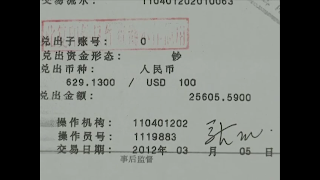
The “Truth” article mentions that Zhang Kai has “accepted financial support from overseas organizations three times to receive systematic training in Western countries on hyping religious conflicts”. This is probably why the abovementioned three dates were marked in red. As a matter of fact, there are three hundred thousand Chinese students currently studying in the United States. Among them, 40% are undergraduates, mostly self-funded, and 40% are graduate students, who are primarily on university scholarships, which means that they also received “financial support from overseas organizations to receive systematic training in Western countries”. Moreover, the Chinese government has been sending groups of officials at all levels to Harvard and other universities to receive training. Do they have any problems doing so? As for the “systematic training on hyping religious conflicts”, is this to say that the students who study in the U.S. receive “systematic training” on “learning conflicts”, and the officials who receive training in the U.S. are learning to hype “political conflicts”? This charge against Zhang Kai indicates only the intent to confuse the public.
After six months’ secret detention and interrogation of Zhang Kai and of a number of other pastors and legal assistants, and after repeatedly searching Zhang Kai’s home in Beijing, the authorities only found such hearsay and speculative evidence on links with “overseas organizations”. Is it because of the incompetency of Wenzhou police? I think not, but rather, it is likely that because some leading officials have imagined Zhang Kai’s bravery and activism with strong support from foreign organizations, otherwise it would have been hard for them to explain such fearless endeavors of an individual on his own. However, if the accusation is based on non-existent events, how could you find evidence? The reason why some people have difficulty understanding Zhang Kai’s devotion to rights defense, is that they cannot understand those human rights lawyers who regard their job as a vocation, the divine calling for those who are Christians, and the basic meaning of rule of law in modern society. Zhang Kai was once taken away on July 10, 2015 during a large-scale crackdown of lawyers, and he later recalled that a female national security official tried to persuade him, “You see, lawyers like Zhou Shifeng have some connections behind them that they could use, but you have none, so why take the risk to be involved in religious cases.” And Zhang Kai replied, “you are wrong, I have connections behind me. What is behind me is God.” This answer will probably be never understood by those Marxist-materialist Chinese officials.
Although Wenzhou police went to great lengths, but for those who know even just a little bit about law, such evidence clearly amounts to nothing, and no wonder the police still dare not to send Zhang Kai to court for trial hearing. In fact, the images shown in that TV confession were merely glances, probably for the purpose of deceiving the audience who do not or cannot pay close attention. Those lawyers, state-sanctioned Three Self Patriotic Movement (TSPM) leaders, and other religious people who were gathered by the authorities to watch the video and then to denounce Zhang Kai, were all deceived by such specious “evidence”.
The “Truth” article and the “Behind” program also claim that Zhang Kai has maintained close ties with foreign organizations, from which he received instructions to “ignite anger and street protests” with a regular basis of “one day every week, to carry out regularly”, so that he could “start with Wenzhou, sweep the country.” Such a set of Communist-style four-character instructions seem intimidating to people, but struck me as very odd and strange as I have lived in the US for more than 27 years. I cannot imagine any overseas organizations would create such instructions, as they feel very much like those conventional instructions of the Chinese Communist Party (CCP). Could some one in some high-level CCP department have coined it, in order to frame Zhang Kai and the so-called foreign organizations behind?
It was also stated that Zhang had hyped nearly 20 religious cases, and that all of which were supported by foreign institutions, and that he was able to earn fame and money which gradually indulged his “political ambitions”, and that he even stated “I could also have the opportunity to be the president of China if things change.” I could not help but laugh out loud upon reading this. Attacking Zhang Kai with the charges of “political ambitions” and the “president dream” shows precisely that the case against Zhang Kai is of political nature, rather than a legal trial for a criminal suspect in a modern state based on the rule of law.
As we have already cleared the lie about making money by defending the rights of churches, and we now see that Zhejiang authority only has specious “evidence” on the other lie about being supported by so-called foreign institutions. Of course, the world is beyond my own vision, so does the capacity of the police, therefore nobody can completely exclude the possibility of foreign organizations supporting Zhang Kai. However, the law should be based on the evidence, rather than speculation. To persecute someone with groundless charges and public denouncement, and to brainwash the audience by parading and campaigning, all of this shows that Zhang Kai’s opponent has neither the courage nor the capability to fight by the law in a fair manner. The rule of law, how faraway it seems! Zhang Kai, as a lawyer, have your dream for the rule of law been shattered?
3. Zhang Kai on the TV screen and the Zhang Kai that I know
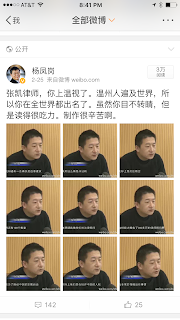
remember him being a tough guy. He grew up in Inner Mongolia, where the vast grasslands cultivated his pure and innocent characteristics, as well as the agility, bravery, and indomitability. Why did he seem like a completely changed man for speaking those pleading words, after being secretly detained for six months? Is it because of the unimaginable torture? Did he choose to compromise in order to be released? Or has he really changed his own self? These questions will only be answered when we meet again in person, when he is in a state of complete freedom. Seen from TV, Zhang Kai has lost significant weight, and has more wrinkles on his forehead. He seems exhausted and even didn’t have the strength to lift his eyelids. He seems to be reading out the lines written in advance and displayed in front of him when he pleaded for guilt, which we can tell from his facial expressions. Those few lines were first read out by Zhang Kai, then spoken by a TV host, and were finally repeated by the audience. All of this seems to have been artificially staged.
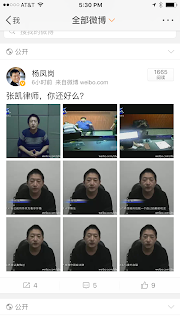
Zhang Kai arrived in the city of West Lafayette, Indiana in August 2013. The fall semester of Purdue always starts in late August, and I always ask visiting scholars to arrive prior to that, in order to be able to attend courses from the very beginning. Like many other visiting scholars, Zhang immediately settled into his new life and began auditing lectures, learning English, and going to church.
These are part of my requirements for all visiting scholars coming to our research center, that they must attend regular courses, make as many local friends as possible, try to understand American society and culture, carry out research in accordance with the plan they proposed, write up research reports, and give at least one public lecture. If we have time and opportunity, I would also arrange certain activities for visiting scholars. For example, since Zhang Kai was a lawyer, he had great interest in the US legal system. The head of our department happens to be an expert in the sociology of law who specializes in studies of American prisons. So I asked him to contact the Indiana prison to arrange a research visit. I remember that I had just come back from an international conference and was quite tired, but I drove two hours with a few visiting scholars, including Zhang, to the prison, which is located in the north of Indiana. It was a special opportunity to observe the US prison and to talk to guards and inmates. In particular, we asked them about the religious activities and related provisions in American prisons. Unfortunately I have been too occupied with various projects and tasks so that I have not been able to write anything based on that rewarding visit.
Other than these activities, normally I am not involved in visiting scholars’ daily life, as I have my own research, teaching, administrative work and family life to attend to. In particular, as I recall now, the year when Zhang Kai was here I was busier than usual, for there was a large-scale project to be completed, and I was recently elected the president of the Society for the Scientific Study of Religion, so I spent even less time on visiting scholars in that year. Now I regret it deeply that I hadn’t talked more with Zhang Kai, hadn’t interviewed him regarding religion and law in China while he was here with us. And Zhang Kai and his wife came to visit me at my home several times, and asked me several times to study the Bible together. However, I was feeling like a rubber band that had already stretched for too long and thin, and a tiny bit more weight would break it down. Therefore I did not arrange that kind of gathering with Zhang Kai. I regret deeply that I didn’t spend enough time and effort to study the Scriptures and pray together with Zhang Kai couple.
By early 2014, as there was some research funding still available out of the closing project, I invited Zhang Kai to help organize a symposium on Religious Freedom and Representative Cases in Chinese Society. We invited a number of human rights lawyers, educators, and pastors who were interested in this topic to attend our symposium from May 5 to 7, 2014, at Purdue. This meeting gave us the opportunity to be in direct touch with several most active human rights lawyers in China and to share their understandings of various legal cases involving religion. I was pleased to see that, after several rounds of arguments and discussions, those lawyers, pastors, and scholars eventually reached a high degree of consensus on issues related to religious freedom. Participants drafted and adopted an article entitled “Consensus On Religious Freedom”, which was published on May 14, 2014 in both Chinese and English, and both versions are now available online. Zhang Kai played an important role in successfully organizing this symposium and reaching the consensus.
Soon after the symposium, I left for Italy as a visiting scientist at the University of Padua for a month, and Zhang Kai went back to China with his wife and their newborn daughter in August of 2014, marking the end of his life as a visiting scholar in the US. I remember having the discussion with him on whether to return to China or not with Zhang Kai. We were both concerned with the situation in China, with hopes and sighs. I have neither advised him to stay in the US nor encouraged him to return to China, as I have always believed that each individual’s situation varies, so does their gifts, talents, and pursuits. God has different callings and plans for different individuals as He communicates personally to each one of them, and these callings and plans can only be accepted by the individual him or herself, not the parent, the spouse, or the sibling. I myself returned to China immediately after I received my doctorate degree in 1997, hoping to see if I could have a job there. After a series of visits to friends, it became clear that that was not the right time, so I returned to America to look for a teaching position instead. I still remain open for my own future and am willing to be taken anywhere by the Holy Spirit, regardless of the country or location.
I saw that Zhang Kai published a “Returning Announcement” on Weibo the day after he returned to Beijing, which stated that “After learning in the United States for a year, we clearly see that although China is full of suffering, it is also experiencing exciting historical changes. We cannot allow ourselves to stand on the sidelines and to miss this great historical moment, the mission and the calling we are supposed to carry on our shoulders. I will pursue the rule of law in China, and the future of which should not be a dream.” This is a clear expression of his careful considerations and his motivation for returning to China, his pursuit of, and dedication to, the dream of the rule of law, and his noble soul.
I visited relatives and friends in China from late June to early July, 2015, and met Zhang Kai again in Beijing. At the time he was spending a lot of time in Wenzhou, fighting for church rights, so I wanted to spare him the trouble of coming all the way to Beijing to meet me. However, Zhang Kai showed great sincerity of friendship and insisted on meeting in person. We had a wonderful time, and this friendship remains precious. And now, however, he has been in prison for more than six months.
4. Beyond “Truth” and “What Lies Behind”
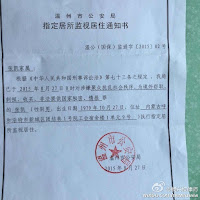
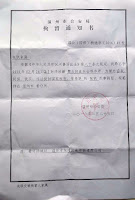
May God watch over and protect Zhang Kai, to comfort him and his parents and relatives.
May Zhang Kai gain his freedom soon.
May Wenzhou, Zhejiang, and China return to the rule of law soon.
March 2, 2016
(The original Chinese article was posted on Weibo twice but censored within a few hours. By the time it was deleted from Weibo, there were about 100,000 and 80,000 downloads, respectively. The article was also circulated widely through WeChat friend circles and groups. Then, it was published as 溫州張凱案的「真相」和「背後」《時代論壇時代講場》(Christian Times, Hong Kong) on March 3, 2016. This English translation was done by GT)
China Aid Contacts
Rachel Ritchie, English Media Director
Cell: (432) 553-1080 | Office: 1+ (888) 889-7757 | Other: (432) 689-6985
Email: [email protected]
Website: www.chinaaid.org
